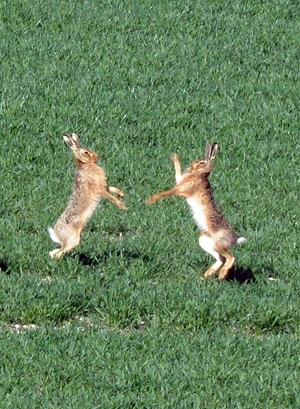 The ferocious bouts of mad March hares boxing are traditionally seen as one of the first harbingers of spring, but according to research charity, the Game & Wildlife Conservation Trust (GWCT), this bizarre courtship ritual is becoming an increasingly rare sight in many parts of the country.
The ferocious bouts of mad March hares boxing are traditionally seen as one of the first harbingers of spring, but according to research charity, the Game & Wildlife Conservation Trust (GWCT), this bizarre courtship ritual is becoming an increasingly rare sight in many parts of the country.
To give landowners, farmers and those interested in brown hare conservation an insight into the factors that are affecting this fascinating mammal, the GWCT will be holding a series of workshops in Devon and Leicestershire this autumn.
Peter Thompson, Biodiversity advisor with the GWCT, said, “We have been studying these wonderful creatures for more than two decades and although they are not rare, it is estimated that their wintering population has dropped by about 75 per cent post-war and this is typical of many other European countries too.”
At least two important factors have contributed to the decline of brown hares. Firstly, predators are now more numerous than they were a century ago and the loss of mixed farming, which provided ideal year round food and shelter has also contributed to their decline.
Peter Thompson added, “Given suitable habitat and protection from predators, hare numbers can increase substantially. Indeed on our research farm at Loddington in Leicestershire, we managed to increase hare numbers 10-fold over a five year period through careful habitat management and by protecting them from predators.”
Although brown hares are doing better in the arable farming regions on the eastern regions of Britain, recent research shows that they are not faring particularly well in the west of the country.
The GWCT’s autumn brown hare workshops aim to show how farmers and landowners can ensure that brown hares thrive on their land.
During the one-day workshops, Peter Thompson and GWCT research scientist Dr Jonathan Reynolds, will give a colourful outline on the history of brown hares, their ecology and reasons for their decline. They will also explain what practical steps can be taken to bring hares back in areas where they have declined as well as touching on the funding opportunities available through Stewardship schemes.
The workshop will also include an outdoor session on the farm to look in detail at habitat requirements and the various ways to manage existing habitats as well as creating new ones. The informal nature of the day ensures that there will be plenty of time for questions and hopefully chances to see brown hares at first hand.
Peter Thompson said, “Our brown hare workshop are always very well attended as people are always keen to do their bit to help conserve this most charismatic of mammals. It would be a sad day if the spectacle of boxing hares became a thing of the past. Indeed we must ensure that it is not a case of ‘hare today, gone tomorrow’ but instead it is a case of ‘hare today, hare forever’.”
The Game & Wildlife Conservation Trust’s brown hare workshops are being run on Tuesday 8th October 2013 at the GWCT’s Allerton Project at Loddington, Leicestershire and on Tuesday 15th October at the Clinton Devon Estate, Budleigh Salterton, Devon. Both courses run from 10.30 to 4.00 pm. The cost for each day is £20.00. Further details or to book a place, please contact Lynda Ferguson on 01425 651013 or email lferguson@gwct.org.uk.
END
Photocaption: The Game & Wildlife Conservation Trust is holding autumn workshops in Leicestershire and Devon on brown hare conservation. Brown hares mate in early spring, and the boxing in which mad March hares indulge and was long thought to be between competing males, is actually a female fighting off unwanted advances from male suitors. Photocredit: Peter Thompson.
Notes to editors
The Game & Wildlife Conservation Trust – providing research-led conservation for a thriving countryside. The GWCT is an independent wildlife conservation charity which has carried out scientific research into Britain’s game and wildlife since the 1930s. We advise farmers and landowners on improving wildlife habitats. We employ more than 60 post-doctoral scientists and other research staff with expertise in areas such as birds, insects, mammals, farming, fish and statistics. We undertake our own research as well as projects funded by contract and grant-aid from government and private bodies.
For information, contact:
Eleanor Williams
Telephone: 07592 025476
Email: press@gwct.org.uk